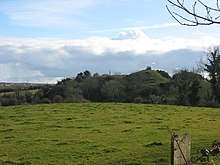Greenmount Motte
Móta Dhruim Chatha | |||||||||
 | |||||||||
| Location | Greenmount, Castlebellingham, County Louth, Ireland | ||||||||
|---|---|---|---|---|---|---|---|---|---|
| Region | Dee Valley | ||||||||
| Coordinates | 53°52′41″N 6°23′09″W / 53.877999°N 6.385855°W | ||||||||
| Type | motte | ||||||||
| Area | 0.7 ha (1.7 acres) | ||||||||
| Height | 12 metres (39 ft) | ||||||||
| History | |||||||||
| Material | earth | ||||||||
| Founded | 12th/13th century | ||||||||
| Periods | Norman Ireland | ||||||||
| Cultures | Cambro-Norman, Old English | ||||||||
| Associated with | Normans | ||||||||
| Site notes | |||||||||
| Excavation dates | 1830 and 1870 | ||||||||
| Archaeologists | Rev. Joseph Dullaghan, John Henry Lefroy | ||||||||
| Public access | yes | ||||||||
| Designation |
| ||||||||
Greenmount Motte is a motte and National Monument in County Louth, Ireland.
Location
Greenmount Motte is located 2.9 km (1.8 mi) west of Annagassan, overlooking the Dee Valley.
History and archaeology
Motte-and-bailey castles were a primitive type of castle built after the Norman invasion, a mound of earth topped by a wooden palisade and tower.[1]
The motte at Greenmount was formerly known as Droim Chatha ("Battle Ridge", Anglicised Dromcath or Drumcath). A Nicholas of Drumcath (Nicholaus de Dromcath) is mentioned in a documents of 1310 and 1328.[2]
The foundations of an elongated chamber (1.5 × 1 m in size, 5.5 m below the summit) are visible in the bailey.[3]
A scabbard-mount with runic inscriptions (DOMNAL SELSHOFOTH A SOERTH THETA, "Domnal Seal's-head owned this sword") was found in excavation, but it believed to be long pre-Norman, indicating that the motte was constructed on the site of an earlier tumulus.[4][5] Also found were animal bones, charcoal, burnt earth, a bronze axe and a bone harp peg with friction marks.[6]
Greenmount was a camp ground for Catholic Irish forces in the Irish Rebellion of 1641. It was excavated in 1830, causing a cave-in, and again in 1870.[citation needed]
References
- ^ "Geograph:: Callan Motte (C) dougf". Retrieved 5 September 2016.
- ^ "Journal". 1 January 1874 – via Google Books.
- ^ McNeill, Tom (1 January 2000). Castles in Ireland: Feudal Power in a Gaelic World. Psychology Press. ISBN 9780415228534 – via Google Books.
- ^ "Proceedings of the Royal Irish Academy: Archaeology, linguistics, and literature". Hodges, Figgis & Company. 1 January 1917 – via Google Books.
- ^ Davidson, Hilda Roderick Ellis (1 January 1998). The Sword in Anglo-Saxon England: Its Archaeology and Literature. Boydell & Brewer Ltd. ISBN 9780851157160 – via Google Books.
- ^ Zhulin, Denis Larionov & Alexander. "Read the eBook History of Kilsaran union of parishes in the County of Louth, being a history of the parishes of Kilsaran, Gernonstown, Stabannon, Manfieldstown, and Dromiskin, with many particulars relating to the by James B Leslie online for free (page 2 of 35)".

